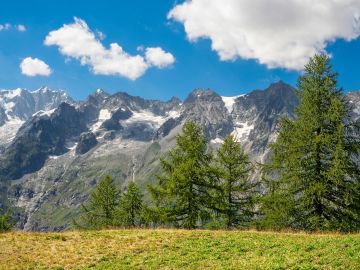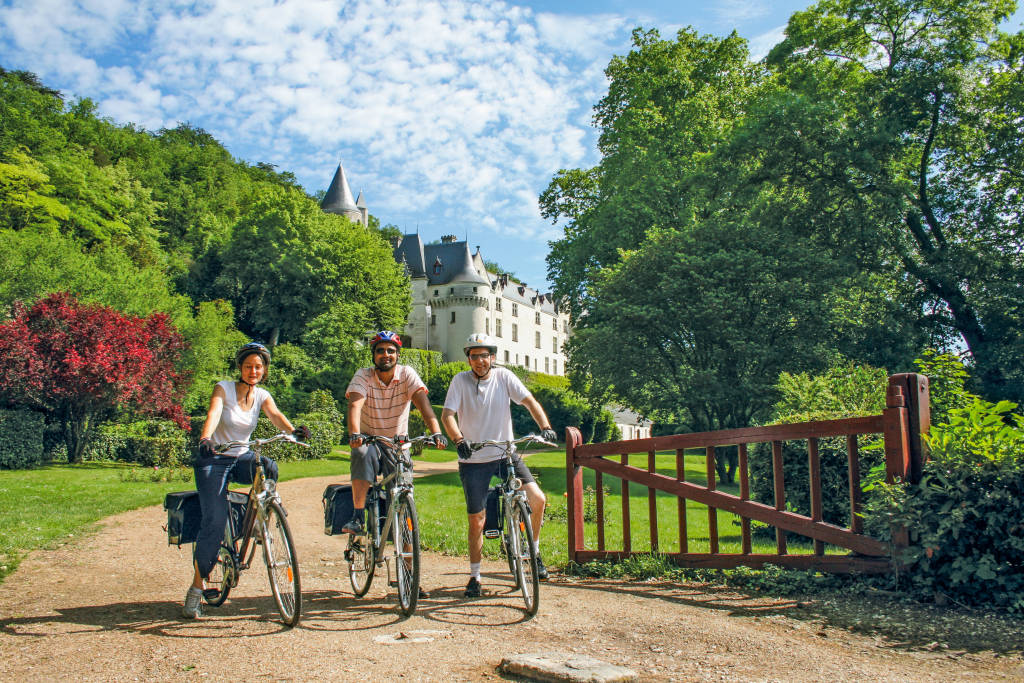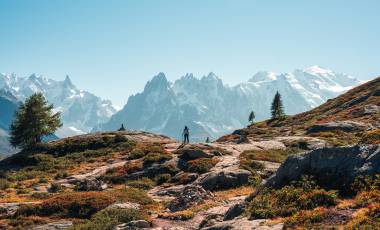
Wander Wisely: Top Responsible Travel Tips
Eager to travel but concerned about the impact your trip might have on the environment? We are, too! At Exodus, our sustainability and impact initiatives are incredibly important to us, from our travel specialists who craft our itineraries and prioritize eco-conscious accommodation, transportation, and destinations, to our expert guides who know all of the best local restaurants serving the freshest farm-to-table treats and more.
As avid travelers, we’re big fans of the world, and we’re working to make sure that it’s healthy and beautiful for generations to come. Protecting the unique ecosystems that we continue to explore on our adventures is more important than ever for the survival of all species who inhabit our beautiful planet. We aim to put nature first on all of our adventures, and France makes it easy with their national focus on sustainability.
Whether you’re exploring the heights of Mont Blanc, taking in the breathtaking landscapes of the Loire Valley, discovering hidden gems in the French Riviera, or escaping to Corsica, France is an eco-friendly hotspot and the perfect place to dream big, live slow, and minimize your negative impact on the natural world. Here are our top tips for the perfect trip to France:

- Travel Under Your Own Power
A typical vacation might include gas-guzzling buses, vans, cars, and other vehicles with harmful emissions that are damaging to the environment. One of the best ways to reduce your pollution is to explore on your own two feet. Hiking tours like the Walks & Gardens of the French Riviera trip let you travel primarily by foot, minimizing the amount of time that you spend in a car. On this tour, you’ll enjoy coastal hiking on the Cote d’Azur, taking in some of the most breathtaking landscapes in France. We use public trains instead of a private vehicle to get to most of the hikes on this trip, further reducing your carbon footprint. Hiking vacations like this have a lesser impact on the environment and the locals, as it is a quiet, low-impact activity requiring comparatively few resources to support.
Cycling is another fantastic option for reducing the impact of your tourism. Cycle Northern France: Brittany to Normandy is a tour that has it all: D-Day beaches, the floating abbey of Mont Saint-Michel, and stunning coastal-countryside terrain. It’s a culture-filled trip that immerses you into everything this region.
By relying on human power rather than fossil fuels, you’ll reduce the carbon footprint of your vacation. Hiking and biking also get you closer to the land, promoting a deeper connection with nature. When you hike or cycle, you engage more intimately with your surroundings, fostering a greater appreciation for the environment and a stronger commitment to its preservation. These activities embody the principles of sustainable travel by minimizing impact, enhancing appreciation for the environment, and promoting responsible tourism.

- Eat Local
It’s undeniable that one of the best parts of travel is the food. Tasting regional delicacies and specialities made from fresh local ingredients and prepared using traditional recipes may not feel like a big deal, but it’s another way that you can reduce your carbon footprint while traveling. By choosing restaurants and accommodation that use locally sourced food which has not been transported long distances, you won’t only be getting the freshest and best tasting culinary experience possible, you’ll also be making a positive impact on the environment.
Eating local reduces the carbon footprint associated with food transportation. When you choose locally sourced produce and cuisine, the food travels shorter distances from farm to table, minimizing the greenhouse gas emissions linked to long-haul transportation and refrigeration. It’s also a great way to contribute to the local economy. We seek out opportunities to support local producers, farmers, winemakers, and more on our tours, so that our itineraries feature only local food.
By spending money on locally grown and produced food, you also help sustain local agriculture and businesses. This economic support can lead to more robust and resilient local food systems, which are essential for community well-being and environmental sustainability. Local farmers often practice sustainable farming techniques, such as crop rotation and organic farming, which have the added benefits of preserving soil health and biodiversity. Fresh, seasonal foods also tend to have a lower environmental impact because they are grown in harmony with the natural growing cycles and climate of the region.
As you Cycle the Loire Valley, you’ll ride past orchards, vineyards, and farm fields, seeing food production first hand before sampling it in gorgeous wine cellars and on picnics provided by nearby restaurants who provide meals in washable containers with locally produced organic food. Learn how to match food and wine directly from expert French sommeliers, tasting delicious local varietals and aperitif platters all created from the fields you rode through. It’s the perfect way to experience farm to table– or glass!

- Venture Off The Beaten Path
We’ve all been to a ‘must-visit’ site, with parking lots jammed full of massive buses, crowded with tourists, following well-trampled paths or lining up for hours to access the bucket-list worthy spot from the cover of the guide book. Many of these destinations are victims of over tourism, and the result is unfortunately often pollution, littering, damage to historical sites, and displacement of locals. It’s an outcome that is in direct opposition to our mission to support people and nature to thrive in harmony.
Off-the-beaten-path destinations are usually less developed and less commercialized, which often means they have retained more of their natural landscapes and local traditions. This preservation is crucial for maintaining biodiversity and cultural diversity, both of which are essential components of a healthy and sustainable environment.
Our small group sizes allow us to ‘tread lighter’ and work to avoid contributing to over tourism by prioritizing these hidden gems and off-the-beaten-path destinations, so that you can help sustain local communities and economies without overwhelming them. When planning your next trip, consider a destination that isn’t at the top of the trends list. The Mountains & Villages of Corsica, for example, is the perfect tour for those looking to dream big and live slow, with incredible mountain scenery and rich history. Caught between France and Italy, yet with its own cuisine, culture and language, Corsica is the perfect destination to avoid the crowds– and the damaging impact that those crowds can have on the environment and the local communities.

- Shop Small
Shopping at local businesses and markets while traveling is one of our favorite activities– and, like eating regional cuisine, it’s also a fun way to ensure your travel has a positive impact. On our Mont Blanc Highlights tour, for example, you’ll stop almost daily in locally run refuges where you can usually have a coffee and a big slice of cake. These are all locally owned establishments and your business is an excellent source of income for the local proprietors and staff. You’ll also have the opportunity to visit the delightful Saturday market in Chamonix, where there are plenty of local shops and cafes. These fun activities have a ripple effect that spreads far beyond your shopping bag.
When you spend money at local shops, markets, and artisans, you help sustain the livelihoods of local entrepreneurs and their employees. Local businesses typically offer products that are made and sourced nearby, meaning they don’t have a large carbon footprint from being shipped from afar.
Shopping locally also helps preserve cultural heritage. Many local businesses offer unique, handmade items that reflect the traditions and craftsmanship of the area. By buying these products, you help keep these cultural practices alive and provide artisans with the means to continue their craft. This cultural preservation is an essential aspect of responsible tourism, as it maintains the identity and diversity of destinations.

- Protect Nature
Beyond reducing your negative environmental impact, there are many ways that your travel can actively protect the natural world and have a positive impact.
Reduce your plastic waste by traveling with a reusable water bottle rather than buying water bottles along the way. This small change can have big results, and we take it a step further by eliminating single-use plastics on all our tours. From picnics packed in reusable or plant-based containers to refillable water bottles, this adds up to a lot of plastic eliminated!
By traveling with Exodus, you’re also contributing to rewilding efforts. We rewild 100 square meters of land for every one of our passengers. What is rewilding? It’s a form of ecological restoration aimed at increasing biodiversity and restoring natural processes. Rewilding helps to restore and protect our planet’s ecosystems and biodiversity, which in turn plays a vital role in tackling climate change.
Healthy natural ecosystems, like diverse forests, wetlands and grasslands, help provide highly effective carbon sinks, removing carbon dioxide from the atmosphere. However, when we diminish or degrade these ecosystems, for example, through deforestation, farming and industrialisation, we not only lose these carbon sinks, but any stored carbon dioxide is released into the atmosphere. The contribution on your behalf to Rewilding Apennines will help to rewild 5,000 hectares of the Italian Apennines over the course of five years, promoting recovery of regional biodiversity.
Want to take your eco-positive role to the next level? Be a citizen scientist and help contribute to the eBioAtlas on select Citizen Science departures in destinations like Portugal, Botswana, and Costa Rica. This incredible program allows you to be part of the species mapping process on your adventures, to help support conservation action and inform world biodiversity policy.
If you want to learn more about “Dream Big, Live Slow” in France, the land of dream destinations, click here.
We work hard to create trips that have a positive impact on the people and places we visit and look after the planet we explore. Learn more about our responsible travel ethos and practice here and find out about the work of the Exodus Adventure Travels Foundation here.

